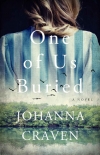One of Us Buried - Johanna Craven (best ereader for pdf and epub .TXT) 📗

- Author: Johanna Craven
Book online «One of Us Buried - Johanna Craven (best ereader for pdf and epub .TXT) 📗». Author Johanna Craven
But the female register was not entirely without benefit. Samuel Marsden was acutely conscious of overcrowding at the “factory above the jail”, and well aware that many women were turning to prostitution in order to secure lodgings, particularly after the fire that destroyed much of the factory in December 1807. The register was part of Marsden’s ongoing attempt to have suitable housing built for the ever-growing number of female convicts. In 1818, he was finally successful, with work beginning on the colony’s second female factory, which would operate from 1821 to 1848. While overcrowding, limited rations, and an unsanitary work environment were still major problems at the new Parramatta factory, the women were at least provided with a place to sleep each night.
*
The Castle Hill Irish rebellion became known as “Australia’s Vinegar Hill”, named after a major battle in the 1798 rebellion in Ireland. While the Castle Hill uprising of 1804 was swiftly quashed by the Rum Corps, its ideals of freedom and justice later served as inspiration for one of Australia’s most famous rebellions. In the Eureka Stockade of 1854, in which gold miners protested against over-policing and unfair laws, rebels used the password “Vinegar Hill”.
*
In 1793, the trading vessel Hope arrived in New South Wales from America carrying much-needed supplies – along with 7,500 gallons of rum. The Hope’s captain stubbornly announced that he would not sell a scrap of his supplies until every ounce of liquor was first purchased. A group of officers from the New South Wales Corps banded together to purchase all the Hope’s cargo without competition. New South Wales, like many British colonies, was short on coins, and rum (a catch-all term for all liquor) soon became an accepted form of currency, with its value largely controlled by the military. The newly nicknamed Rum Corps soon began importing stills, exchanging the liquor produced for food and labour at extremely favourable rates.
In 1806, William Bligh became governor of New South Wales. He found himself in charge of a colony with a severe shortage of food, largely due to the fact that so much of the grain produced was being used to make liquor, rather than bread.
Bligh had been ordered to control the use of alcohol as currency, and put an end to the Rum Corps’ monopoly on trade. Almost immediately upon his arrival in New South Wales, Bligh clashed with Captain John Macarthur, a prominent landowner, politician and former military officer who held great sway over both the Rum Corps and the colony at large. Bligh was an iron-willed disciplinarian, a trait that had contributed to his infamous mutiny on the Bounty, and was again to be his undoing in New South Wales.
In January 1808, Macarthur was due to face trial over an unpaid fine, however refused to be tried by the judge, Richard Atkins, on the basis that Atkins owed him money. Macarthur received the support of the six Rum Corps officers presiding over the trial.
The following morning, Bligh requested the officers present themselves at Government House to face charges of treason. Rather than doing so, the soldiers called for their commanding officer, Major George Johnson. After almost two years of tension between Bligh and the military, Major Johnson appointed himself lieutenant governor of New South Wales, despite there being no legal grounds for him to do so.
On the evening of the 26th of January 1808, the twentieth anniversary of the First Fleet’s arrival in Sydney Cove, almost the entire New South Wales Corps marched on Government House to arrest Bligh. He and his daughter remained under house arrest for more than a year, with Major Johnson and Captain Macarthur taking control of the colony. The rumour that Bligh was cowering under the bed when the soldiers arrived was almost certainly started by the Rum Corps themselves.
*
The colony’s first piano was brought to New South Wales by First Fleet surgeon George Wogan, and gifted to Elizabeth Macarthur several years later. After many years in the custody of Edith Cowan University in Perth, Western Australia, the piano was returned to the UK in 2019, to be restored in Bath.
BY THE SAME AUTHOR
NOVELS
Bridles Lane (West Country Trilogy #1)
Hills of Silver (West Country Trilogy #2)
Wild Light (West Country Trilogy #3)
Forgotten Places
The Devil and the Deep Blue Sea
SHORT STORIES
Moonshine (West Country Trilogy Prequel)
Goldfields: A Ghost Story
The Dutchman
Afterlife
ABOUT THE AUTHOR Johanna Craven is an Australian-born author, composer, pianist and terrible folk fiddler. She currently divides her time between London and Melbourne. Her more questionable hobbies include ghost hunting, meditative dance and pretending to be a competitor on The Amazing Race when travelling abroad.
Find out more at Johanna’s website, or follow her on Facebook or Instagram.





Comments (0)